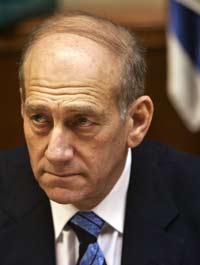|
Doctors wait to bring Sharon out of coma
(AP)
Updated: 2006-01-09 06:59 Doctors will pass their assessment of brain damage to Attorney General Meni
Mazuz.
"They will inform us the moment they wake him up from the sedation and they
will know what systems were damaged and what his situation is," Justice Ministry
spokesman Jacob Galanti said.

Acting Israeli
Prime Minister Ehud Olmert attends the weekly cabinet meeting at the Prime
Minister's Office in Jerusalem January 8,
2006. [Reuters] | If doctors determine that Sharon is permanently incapacitated, the Cabinet
would meet immediately to choose a new prime minister from the five sitting
Cabinet ministers from Sharon's Kadima Party who also are lawmakers.
Olmert is seen as Sharon's potential heir.
One of Sharon's surgeons, Dr. Jose Cohen, said that while the premier's
chances of survival were high, his ability to think and reason would be
impaired.
"He will not continue to be prime minister, but maybe he will be able to
understand and to speak," the Argentina-born Cohen said in comments published
Sunday by The Jerusalem Post.
Outside experts were even less optimistic.
"There is zero expectation on my part that he will have the capacity to
perform in any kind of formal way," said Dr. Keith Siller, Medical Director at
the NYU Comprehensive Stroke Care Center.
"We are basically hoping he survives and that he has some kind of ability to
get some rehab so he can have some useful function again. But we are talking
about the basics, we are talking very basic things. The complexity of this man,
and what he did for a living, this is not to even be considered now. This is
absolutely unrealistic at this time."
Israel's Cabinet met for its weekly gathering Sunday for the first time since
Sharon's stroke.
Olmert sat next to Sharon's empty chair, the prime minister's untouched gavel
rested in the middle of the table.
Olmert told the ministers that Sharon would want everyone to get back to work
on the country's pressing security, social and economic issues.
"This we will continue to do," he said. "We will continue also to carry out
the wishes of Sharon, to manage affairs as necessary."
The Cabinet meeting was Olmert's first formal opportunity to persuade
Israelis and the world that the nation's affairs were in good hands and that he
would pursue Sharon's political program.
Speaking to reporters later, Olmert expressed hope Sharon would get better.
"I pray with all the people of Israel that my tenure as acting prime minister
will be short, so soon enough we will be able to see again the leader of
Israel," he said.
Before his collapse, Sharon appeared headed to a landslide victory in March
28 elections as head of his new centrist Kadima Party, formed in the wake of his
withdrawal from Gaza this summer. Sharon was expected in a third term to try to
draw Israel's permanent boundaries, evacuating small West Bank settlements while
strengthening Israel's hold over larger ones.
But it is unclear whether Olmert or any other successor would have the
popularity or charisma to carry out such a plan.
Sharon had been reluctant to resume long-stalled peace talks, saying the
Palestinians were not a trustworthy partner.
In the West Bank, Palestinian Prime Minister Ahmed Qureia wished Sharon a
quick recovery and expressed hope for new peace talks.
"We are looking for a new era in which we can negotiate and be partners in a
real peace that serves both peoples," he told his Cabinet.
|